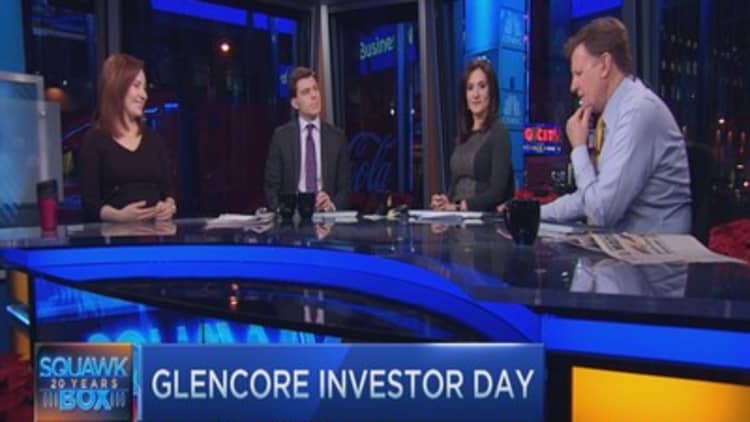


Mining and trading company Glencore on Thursday said it was prepared for current and even lower commodity prices, as it increased its net debt reduction target and deepened its capital spending cuts.
The London-listed company said it now targets net debt of $18 billion to $19 billion by the end of 2016, from a previous target of $20 billion.
The company's London-listed shares rallied as much as 14 percent to over 92p ($1.40) in mid-morning trade as chief executive Ivan Glasenberg hosted an investor update call and outlined plans for further cost cutting. The stock pared gains but finished the session higher by 7 percent.
"We will continue cutting costs lower. We believe not to create more supply in an oversupplied market, it is important to reduce these positions even if they are cash positive," Glasenberg said on the call.
Glencore has come under pressure from investors and ratings agencies to cut its net debt of $30 billion, one of the highest in the industry, as prices for its key products copper and coal sank to multi-year lows.
"Today we show significant delivery on those commitments, with $8.7 billion achieved to date, and are able to announce an increase in our net debt reduction target measures," Glasenberg said in a statement released ahead of the group's investor day.
Preserving investment grade
Chief financial officer Steve Kalmin said the firm remains focused on preserving its investment grade rating and was in talks with ratings agencies on its cash flow.
Glencore has investment-grade credit ratings of BBB from Standard and Poor's and Baa2 by Moody's Investors Service and is targeting to gain one notch to BBB+ or Baa1 in the medium term, according to Kalmin.

The Swiss-based commodities giant also cut its capital expenditure for 2015 to $5.7 billion from $6 billion. The spending is seen falling to $3.8 billion in 2016 from a previous estimate of $5 billion.
The firm outlined its debt-reduction plan, which involves asset sales, reducing capital expenditure, suspending dividend payments and raising $2.5 billion of new equity capital, with some $1.1 billion in asset sales have already been completed, Kalmin said on the call.
"We are still generating over $2 billion in free cash flow even at this stage in the market, we are one of the few companies in this market able to do that," Glasenberg said.
Agri business sale
Glencore said its trading division, or what the company calls marketing, will generate adjusted earnings of $2.5 billion in 2015, coming in at the lower end of its guidance of $2.5 billion to $2.6 billion.
The company set a guidance of $2.4 billion to $2.7 billion for the division earnings in 2016, which it said it reflects lower working capital levels and reduced copper, zinc, lead and coal volumes.
As part of Glencore's longer-term cost cutting and debt reduction plans, the group said it was planning on selling a minority stake in its agriculture business and had considered bids from the likes of private equity firms, sovereign wealth funds and pension funds. Finding a minority partner was a priority, but the commodity trader said it was also looking into the option of an initial public offering (IPO) for the division.
Glencore makes about a quarter of its earnings from commodities trading, which had previously allowed it to withstand a steep fall in oil and metal prices slightly better than pure-play miners.
The trading division came under the spotlight after it generated lower-than-expected earnings in the first half and the company cut trading's full-year earnings forecast.
The firm has no plans to sell the majority stake in its agriculture business, unless "someone throws a massive number at us and creates more value than we think its worth," Glasenberg said, adding "we are traders, we will take the best price available."
Glasenberg said he would also consider further infrastructure divestments and the selling of assets at the right price.
"We continue getting approaches from particular companies on certain parts of the company, We will always look at these."
Glencore said it estimated 2016 EBITDA of $7.7 billion for the whole group at current prices.
Nickel pain
When questioned by well known commodities fund manager at Blackrock, Evy Hambro on the weakness in the nickel price relative to copper, Glasenberg said that some 60-70 percent of the world's nickel production is currently cash negative.
"Big mining companies keep operations open praying for better prices. Maybe you should ask these other mining companies why they are bleeding cash and not shutting their operations," Glasenberg told Hambro on the investor call.
Of all it assets, Glasenberg said just two run by the company are no longer cash positive, the Minara nickel mine in Australia and the Sherwin Alumina asset in U.S.
The group is considering shortly whether to reduce both assets to just "care and maintenance" if prices remain negative.
Reuters contributed to this report.




